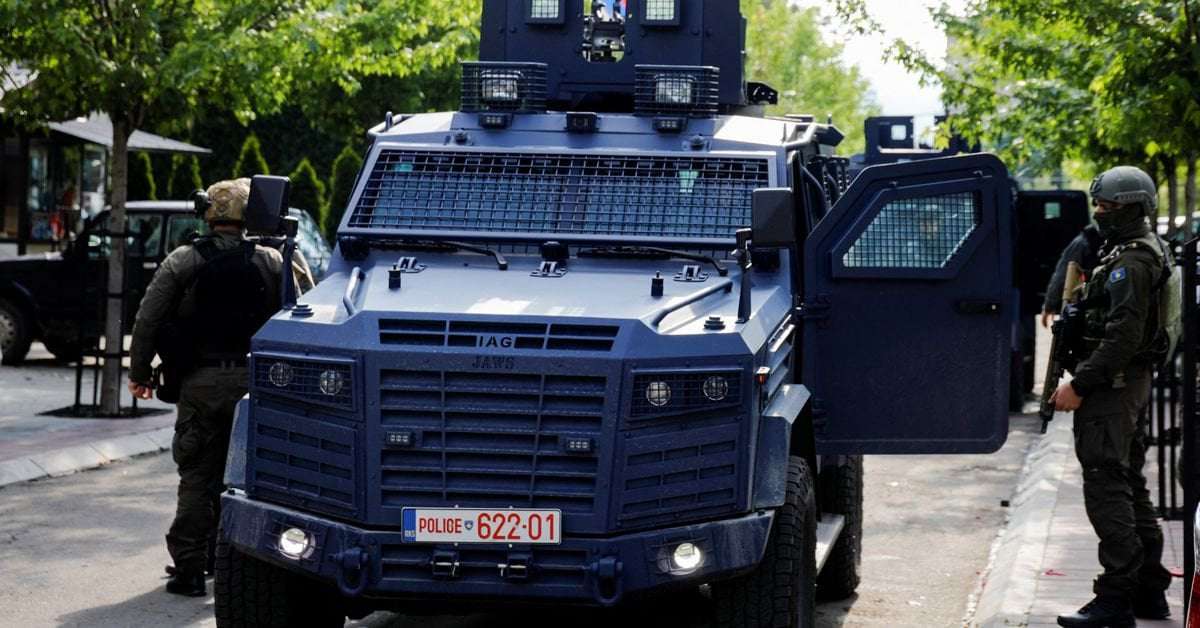[1/6] Members of Kosovo special police forces guard the municipal offices in Zvecan after ethnic Serb protestors tried to prevent a newly-elected ethnic Albanian mayor from entering the office in Zvecan, Kosovo, May 27, 2023.REUTERS/Ognen Teofilovski
BRUSSELS, May 27 (Reuters) - NATO on Saturday urged Kosovo to dial down tensions with Serbia, a day after its government forcibly accessed municipal buildings to install mayors in ethnic Serb areas in the north of the country.
The resulting clashes on Friday between Kosovan police and protesters opposed to the ethnic Albanian mayors prompted Serbia to put its army on full combat alert and to move units closer to the border.
"We urge the institutions in Kosovo to de-escalate immediately and call on all parties to resolve the situation through dialogue," said Oana Lungescu, a spokeswoman for the transatlantic military alliance, in a Twitter post.
She said KFOR, the 3,800-strong NATO-led peacekeeping mission in Kosovo, would remain vigilant.
Things were still tense in the north part of the country where heavily armed police forces in armoured vehicles were guarding municipality buildings.
Kosovo's Prime Minister Albin Kurti defended police actions in escorting the new mayors the previous day.
"It is the right of those elected in democratic elections to assume office without threats or intimidation. It is also the right of citizens to be served by those elected officials," Kurti said on Twitter on Saturday.
U.S. Secretary of State Antony Blinken on Friday criticized Kurti's government for its actions in the north, saying they "unnecessarily escalated tensions, (were) undermining our efforts to help normalize relations between Kosovo and Serbia and will have consequences for our bilateral relations with Kosovo."
Almost a decade after the end of a war there, Serbs in Kosovo's northern region do not accept Kosovo's 2008 declaration of independence from Serbia and still see Belgrade as their capital.
Ethnic Albanians form more than 90% of the population in Kosovo, with Serbs only the majority in the northern region.
Reporting by Sabine Siebold; additional reporting by Fatos Bytyci in Pristina; Writing by Foo Yun Chee; Editing by Conor Humphries
Our Standards: The Thomson Reuters Trust Principles.

Admirable_Custard608 on May 27th, 2023 at 23:42 UTC »
https://balkaninsight.com/2021/09/06/the-soldier-in-the-photograph-in-memory-of-richard-holbrooke/
That picture basically committed the Americans to help the KLA. Emotions were running high after the West had failed to stop the Bosnian war's bloodbath at the very beginning, so there were incentives to act fast against a very forceful Serbian police and military intervention against the Albanian community. Serbia had also not really made friends in the international community, and Russia was too weak at the time to help the Serbs.
Today, as the good Monday morning quarterbacks that we are, we can say that the intervention - which included heavy bombings on Serbia's military and civilian infrastructure - was a mistake, as it contributed to keeping Milosevic in power for a few more years. And the language included in the Rambouillet accords was purportedly ambiguous - Kosovo first was supposed to only be an "autonomous" province (it only became independent more recently).
King_Kvnt on May 27th, 2023 at 20:02 UTC »
Given that the ethnic Albanians in Kosovo overwhelmingly want to merge with Albania (and Greater Albania has been an explicit goal of the "Kosovo liberation" movement from the start), I doubt that Kosovo will de-escalate. Especially if it feels that it will retain support of select NATO powers regardless of the warnings.
Admirable_Custard608 on May 27th, 2023 at 15:37 UTC »
Among the amazing things Richard Hoolbroke produced during his career as a diplomat, he also made some more controversial moves that are stoking tensions to this day.
The piece describes Serbian protests to the installment of an ethnic Albanian mayor in the northern region of Kosovo - where ethnic Serbs are the majority.
It is a very delicate issue because (i) it's in the Balkans, which is one of the most volatile regions of Europe, (ii) because it comes at a time where tensions between Russia and the West are at the highest they've been since the cold war (please read here for some context) and (iii) because the European Union is stalling the accession of North Macedonia, Montenegro and Albania.